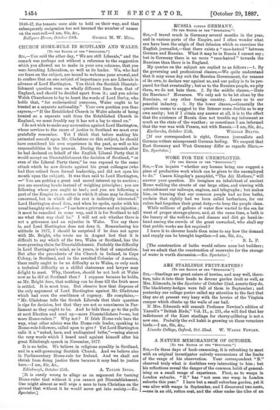CHURCH HOME-RULE IN SCOTLAND AND WALES. [To THE EDITOR or
THE srin-uvoa."3 Sra,—You said the other day, "We are still Liberals," and the remark was perhaps not without a reference to the suggestion which you allowed me to make in your own columns, that you were forsaking Liberalism, as well as its leader. We, who had our fears on the subject, are bound to welcome your avowal, and to confess that on one subject of importance you are Liberals in advance of Lord Hartington. You think the Scottish Disestab- lishment question runs on wholly different lines from that of England, and should be decided apart from it ; and you advise Welsh Churchmen to lay to heart the words of Lord Derby, who holds that, 'for ecclesiastical purposes, Wales ought to be treated as a separate nationality." Your own position you thus express,—" If the Established Church in Wales admits of being treated as a separate unit from the Established Church in England, we must frankly say it has not a leg to stand on."
I do not wish to make any accusation against Lord Hartington, whose services to the cause of justice in Scotland we must ever gratefully remember. Yet I think that before making his animated assault upon Mr. Gladstone on this subject, he should have considered his own experience in the past, as well as his responsibilities in the present. During the twelvemonth after he had declared on behalf of the English Liberal Party that it would accept on Disestablishment the decision of Scotland, "or even of the Liberal Party there," he was exposed to the same attack which he now directs against his great colleague (who had then retired from formal leadership, and did not open his mouth upon the subject). It was then said to Lord Hartington, —" Yon are putting a great and sacred interest up to auction ; you are counting heads instead of weighing principles ; you are following where you ought to lead; and you are following a part of the Empire in a matter in which it alone may be directly concerned, but in which all the rest is indirectly interested." Lord Hartington stood firm, and when he spoke, spoke with his usual haughty wisdom.—" I see here a grievance and an injustice ; it must be remedied in some way, and it is for Scotland to tell me what that way shall be." I will not ask whether there is not a grievance and an Injustice in Wales. You say there is, and Lord Hartington does not deny it. Remembering his attitude in 1877, I should be surprised if he does not agree with Mr. Bright, who wrote me in August last that it is difficult to say which of the two, Wales or Scotland, has the more pressing claim for Disestablishment. Probably the difficulty in Lord Hartington's mind, as in yours, is that of amputation. But after the precedents of the Church in Ireland, in Cape Colony, in Scotland, and in the revolted Colonies of America, there really ought to be no difficulty as to Wales, or only such a technical difficulty as a skilful statesman and lawyer may delight to meet. Why, therefore, should he not look at Wales now as he did at Scotland then ? I suppose because he holds, as Mr. Bright does, that nothing can be done till the Irish mess is settled. It is most true. But observe how that disposes of the only argument of Lord Hartington against Mr. Gladstone which had even the semblance of cogency. He complains,— " Mr. Gladstone tells the Scotch Liberals that their question is ripe for decision, but that they are not so unanimous in Par- liament as they ought to be. And he bids them go to the polls at next Election and send up—more Disestablishers ?—no, but more Home-rulers !" Why not ? If Irish Home-rule bare the way, what other advice was the Home-rule leader, speaking to Home-rule followers, called upon to give? Yet Lord Hartington calls it a "naked, bare, and undisguised bribe,"—using almost the very words which I heard used against himself after his great Edinburgh speech in November, 1877.
It is no bribe. We believe in religious equality in Scotland, and in a self-governing Scottish Church. And we believe also in Parliamentary Home-rule for Ireland. And we shall not shrink from doing justice there because it may lead to justice here.—I am, Sir, &e., [It is surely wrong to allege as an argument for turning Home-ruler that without it you cannot get Disestablishment. One might almost as well urge a man to turn Christian on the ground that without it he would never get into society.—En.
Spectator.]


































 Previous page
Previous page